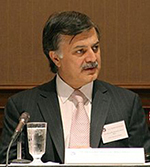Humayun Akhtar Khan

Chairman & CEO , Board of Institute for Policy Reforms
Mr. Humayun Akhtar Khan’s career spans the areas of politics, entrepreneurship, philanthropy, and the actuarial profession.
Mr. Khan entered politics in 1990 as a dynamic and young reformer in the then indifferent world of Pakistan politics. Unconstrained by a non-feudal background and fresh from exposure to the rigorous profession of actuary, Mr. Khan advocated tailoring of policies to empower the working middle class. He entered with a political vision at a time when politics was about survival alone. He infused energy and purpose in the country’s political institutions.
From 1997 to 1999, Mr. Khan was State Minister for Investment and Chairman Board of Investment. Immediately, he presented a new Investment Policy to deregulate and rationalize processes to capture Pakistan’s investment potential. These efforts bore fruit. Domestic and foreign investment grew rapidly. The 1997 Investment Policy is still considered among the best reform initiatives in the developing world. It opened Pakistan to foreign investment resulting in billions of dollars of FDI in to Pakistan.
From 2002 to 2007, Mr. Khan was Pakistan’s federal Commerce Minister. This position combines a number of roles. The Commerce Minister is responsible for the country’s international trade policy, is the country’s chief trade negotiator, as well as builds business competitiveness for international markets. A firm believer in the development benefits of international trade, Mr. Khan worked aggressively to liberalize multilateral trade. Internationally, through his visible role in the Doha multilateral talks, he was recognized as an ardent supporter of global trade talks. He was designated a facilitator in the Hong Kong Ministerial in 2005.
With multilateral trade talks at an impasse, Mr. Khan pursued liberalization through a series of bilateral and regional trade agreement. His main initiatives include FTAs with China, Malaysia and the South Asia region. These were some of the most complex and sensitive agreements to pursue with the need to harmonize among political, diplomatic, and trade considerations.
At the same time, he asserted Pakistan’s commercial interests in the world trading system. To support domestic business against unfair competition, he strengthened the country’s trade remedy laws. He also initiated legislation and initiatives for a number of behind-the-border reforms. During this period, he maintained special relations with his counterparts in USA and EU, as well as in the developing countries, and coordinated activities with them.
Mr. Khan remains deeply engaged in public policy. He piloted the Blueprint for Pakistan’s Economic Revival and in 2011 the Road Map for Pakistan’s Recovery. He is also the inspiration behind the Institute for Policy Reforms. This Institute represents his belief in the future of the country and the role of public policy in its turnaround. He believes that increase in the country’s governance capacity is essential to enable it to face its many challenges. At a time when public trust in leadership is at an all-time low, his vision for a progressive and dynamic Pakistan has a refreshing and reassuring appeal.

Follow Us!
Follow us for weekly new posts, free plugins, tips, news and site updates